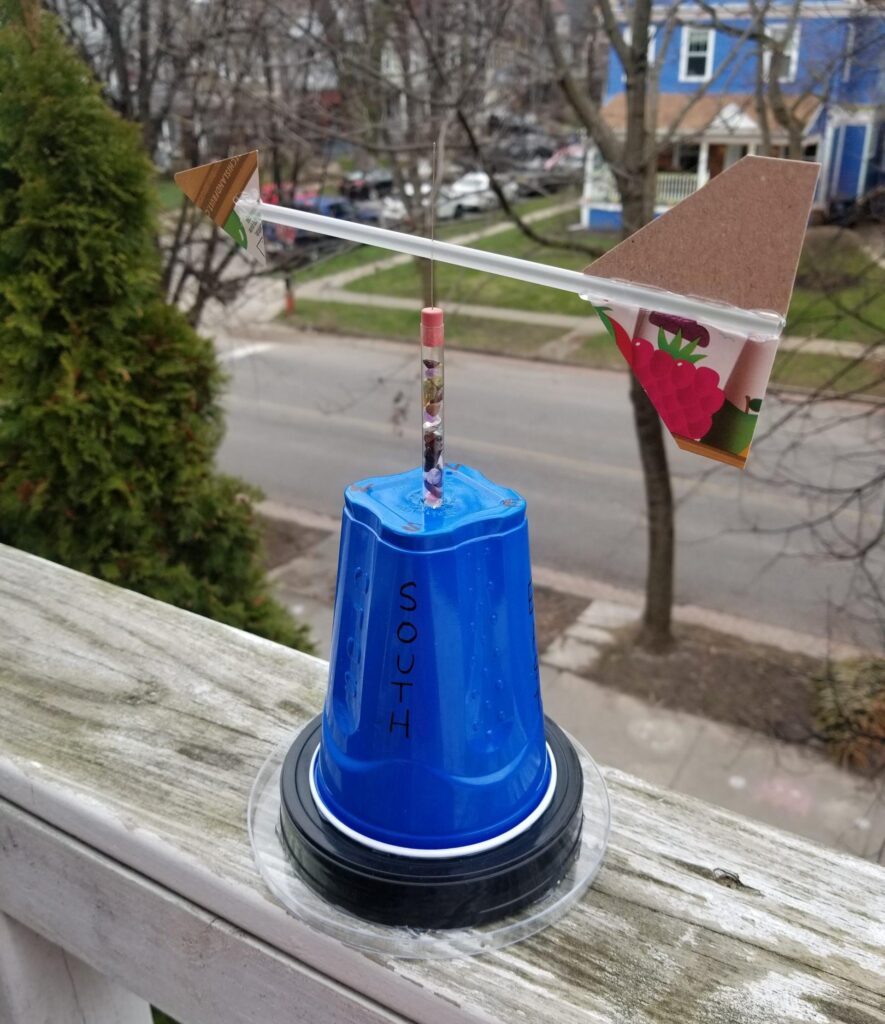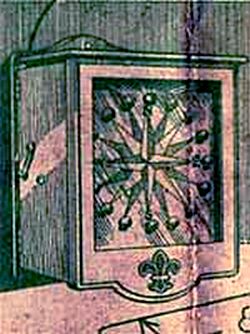Last updated on May 12th, 2025 at 11:09 pm
Weathervanes can be very simple constructions or detailed works of art. They are often installed as an outdoor decorating feature, but a weathervane serves a useful function as well – it tells you which way the wind is blowing.

How to Make a Weathervane or Wind Vane
To make a very simple weathervane, you’ll need a plastic cup with a lid, some thin card stock, two plastic straws, and a small piece of tape to join the straws together. You’ll find directions to make a DIY Weather Station, including this weathervane project, at Inventors of Tomorrow.
Like all weathervanes, this simple construction tells you which direction the wind is blowing from and that is very useful information. In the northern hemisphere, wind from the north predicts colder weather; if the wind is blowing in from the south, the prediction is warmer weather.
The Buffalo Museum of Science also has a similar DIY wind vane with step-by-step photos to follow. The finished result looks like this:

DIY School Wind Vane Project
Teachers will find instructions on how to make a wind vane from cardboard in the video below.

Folk Art Weathervane How-to and Lesson Plan
For a more decorative touch, kids might like to paint a tabletop weathervane made from cardboard or thin wood.
You’ll find how-to’s and a lesson plan on the Folk Art Weathervane page at KinderArt, including links to some free folk art patterns like this rooster outline.
Other Fun Shapes to Make Weather Vanes

You can make weather vanes in all kinds of fun animal shapes like birds, horses, fish or other aquatic wildlife such as this endearing octupus weather vane from Handmade Charlotte.
An easy recycling craft, this octupus weather vane project includes printable templates and begins with a simple coloring activity.
A Challenge for Motivated Weathervane Woodworkers

Woodworkers may find this unique Animated Cowboy WeatherVane, from the Woodcrafter.net, an interesting challenge. The detailed plans are free to download as PDF files, but the creator cautions that this woodworking project requires extreme precision and attention to detail.

Shaping a propeller for a weathervane or windmill can be tricky for even experienced woodworkers. But the Woodcrafter also has a free PDF file of explaining how to make different types of propellers, using a protractor, a wood lathe and a band saw or mitre saw. As a bonus, you’ll find lots of other free woodworking plans offered on the same page.
Finally, for the eclectic collector of weathervanes, FineScrollSaw.com has a free PDF file containing directions to make a Novel Electric Weathervane.
Weathervane History
You Need A Weathervane To Tell Which Way The Wind Blows
Weathervanes, or wind vanes, have been used for centuries. Since the time of the ancient Greeks, the weather vane has served a dual purpose. Since the advent of the weathervane, their use has been both decorative and functional. The source of the wind may not have been fully understood, but people of ancient cultures understood how important the wind is a predictor of the weather.
It is no surprise that the simple weathervane became as ornamental as it is practical. Historians believe one of the first weathervanes was part of the Tower of Winds in ancient Greece. The tower was believed to have been constructed around forty B.C. by the astronomer Andronicus.
The Romans constructed many weathervanes from images of the gods. Prior to the advent of recorded scientific observation, there was much superstition around the weather. Through good weather or bad, the gods were often given credit for the prevailing winds.
Ancient seafarers used a simple type of weathervane, in the form of a small piece of cloth fastened to the rigging. This makeshift wind vane came to be known as a telltale and is still used today by sailors.
The weather vane existed in almost every ancient culture. Aside from depictions of various gods, animal themes are common for wind vanes, even today. The use of animal characters usually had a connection to religious beliefs. Artisans have adopted the weathervane as a medium for their craft adding to the decorative qualities of these simple weather tools.
Balance is the Key to a Well-Designed Weathervane
Balance is the key to a properly functioning weathervane, as the weathervane must be able to turn in reaction to the slightest breeze. The center of the weathervane must rest on a center axis and be equally balanced on both sides. A basic design includes a center post with the body of the weathervane resting over it. The center post may come to a sharply tapered point. The body of the weathervane would fit on the post in a way were the weight would be concentrated directly on the point. If the body of the weathervane is not allowed to move freely, its reaction to changes in wind direction and speed will be too slow.
The shape of the weather vane can vary from a simple arrow, to more ornate and decorative figures. Even a large weathervane can be designed in way that optimizes its reaction to the wind. The shape is probably more important than the size. The body of the weathervane must designed in a way that is somewhat aerodynamic. An airplane wing creates lift by generating a positive pressure under the wing surface and a negative pressure on the top. Think of a weathervane as a wing surface turned perpendicular to the ground. The reaction to both positive and negative pressure causes the weather vane to turn.
Farmers and ranchers often relied on the wind to operate water pumps. Anyone who has traveled the American heartland may remember seeing these simple windmills turning. A key to an operating windmill is its ability to rotate with changes in wind direction. These windmills have a tail stock that acts in the same way a weathervane does, helping to point the blades of the windmill in the optimal direction.
For most of us, the need for a windmill has little to do with whether we have a weathervane. In these days of modern meteorology, weather predictions are readily available, often in great detail. These advancements in modern technology have rendered the humble weather vane to a decorative addition to our homes. Like many pieces of Americana, antique weathervanes are collectible. Many diverse themes have been used for the wind vane from the artistic to the humorous. With a rich history and functionality, the humble windmill can add a touch of whimsy and lore to your home.
Resources:
- PBS Kids for Parents: Make a Wind Vane from a Plastic Straw
- WikiHow: Cardboard and Clay Wind Vane
- Thoughtco: A Brief History of Weathervanes


